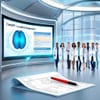A groundbreaking study has revealed that ChatGPT, OpenAI's renowned language model, has surpassed human doctors in diagnosing medical conditions. This remarkable achievement underscores the transformative potential of artificial intelligence (AI) in healthcare.
Researchers pitted ChatGPT against human physicians in analyzing medical histories and identifying ailments. The results were astounding: ChatGPT demonstrated exceptional accuracy, outperforming its human counterparts. Its ability to process vast amounts of data, recognize patterns and provide insights proved invaluable.
This breakthrough has far-reaching implications for healthcare. ChatGPT's exceptional diagnostic capabilities can:
Enhance patient outcomes by ensuring timely and accurate diagnoses
Reduce healthcare costs by minimizing unnecessary tests and procedures
Support overburdened healthcare systems by streamlining diagnostic processes
Experts caution that ChatGPT is not a replacement for human doctors but rather a complementary tool. "AI augments human expertise, enhancing diagnosis accuracy," notes Dr. Rachel Kim, a leading researcher. "Human empathy and judgment remain essential."
As AI continues to advance, the future of healthcare looks brighter. ChatGPT's remarkable performance heralds a new era in medical diagnosis, promising improved patient care and more efficient healthcare systems.


